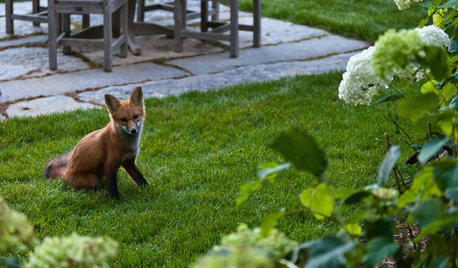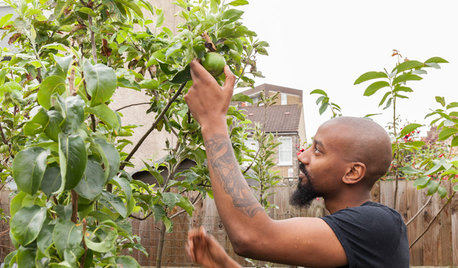Safety of Horse Manure
joyfulgardener
18 years ago
Related Stories

GARDENING GUIDESThe Poop Scoop: Enrich Your Soil With Good Old Manure
Get over the ick factor already — this natural super-ingredient for soil has so many benefits, you'll wonder why you ever went chemical
Full Story
BACKYARD STUDIOSSee Why This Architect's Office Has a Built-In Safety Net
A Maine backyard studio gets high marks for energy efficiency, and its safety-net hangout adds low-tech fun
Full Story
FUN HOUZZThe Cutest Darn Animals on Houzz
You might end up admiring these horses, goats, llamas and more until the cows come home
Full Story
HEALTHY HOMEHow to Childproof Your Home: Expert Advice
Safety strategies, Part 1: Get the lowdown from the pros on which areas of the home need locks, lids, gates and more
Full Story
GARDENING GUIDESLush, Foodie Abundance in a Small Urban Garden
This modest backyard garden provides its owner with fruit and vegetables all year round, thanks to an innovative low-maintenance approach
Full Story
WOODWORKINGBuild Your Own Wooden Deck Chair From a Pallet — for $10!
Take the ecofriendly high road with a low-cost outdoor chair you make yourself
Full Story
GARDENING GUIDESA Mom, a Garden and a Gift for the Neighbors
Gardening can be therapeutic in unexpected ways. See how one gardener found peace and purpose in a patch of Florida soil
Full Story
ARCHITECTUREAll the Possibilities: 4 Homes at the Edge of the Earth
Travel to the far reaches of land, where these residences straddle rocky cliffs, leafy lakeshores and choppy inlets
Full Story
REMODELING GUIDESHouzz Tour: A Former Stable Becomes a Live-Work Showcase
Two floors in a Washington, D.C., building get an extensive rehab to house a family and an architectural practice
Full Story
GARDENING AND LANDSCAPINGSee a Family Greenhouse Grown From Scraps
Can-do resourcefulness and less than $400 lead to a new 8- by 8-foot home for plants on a Tennessee family's property
Full Story






byron
Kimmsr
Related Professionals
Arlington Landscape Architects & Landscape Designers · Deer Park Landscape Architects & Landscape Designers · Mitchellville Landscape Architects & Landscape Designers · Palm Springs Landscape Architects & Landscape Designers · Finneytown Landscape Architects & Landscape Designers · Medford Landscape Contractors · Azalea Park Landscape Contractors · Galt Landscape Contractors · Lynn Landscape Contractors · Midland Landscape Contractors · Selma Landscape Contractors · Atlantic City Decks, Patios & Outdoor Enclosures · Cape Coral Decks, Patios & Outdoor Enclosures · Fort Mill Decks, Patios & Outdoor Enclosures · Scotts Valley Decks, Patios & Outdoor EnclosuresDibbit
apcohrs
Bo Svenson
User
coriander
squeeze
Organic_johnny
apcohrs
byron
Organic_johnny
MLcom
prairiemoon2 z6b MA
rosebush
rosebush
kenyadenola
Kimmsr
patty4150
alutz
Kimmsr
alutz
novice_2009
Kimmsr
novice_2009
JaneGael
JaneGael
greenbean08_gw
Kimmsr
organicguy
guardenman
greenbean08_gw
Kimmsr
organicguy